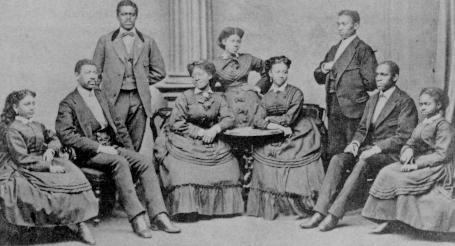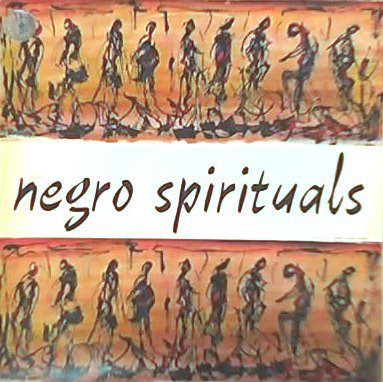
What Is “Spiritual Music”?
No one knows exactly when Negro Spirituals were created, but it is accredited as a musical genre created by slaves. Spirituals were sung by slaves for numerous reasons including to express the deep melancholy they felt, their strong beliefs that God would get them through the rough times, and their strong desires for freedom. Often spirituals were a double entendre as a way of communicating a double meaning behind them, not meant for the masters to hear and interpret. Spirituals had certain attributes to them such as:
- A Call-Response: This originated in the regions of West and Central Africa. A call-response is when someone or something (like an instrument) sings first creating a musical statement, and then is answered by someone else, an instrument, or a group like a choir.
- Dance movement like hand clapping, body movement, or other movement that showed religious appreciation.
- Polyrhythmic foundations: This is various rhythmic structures.
Spirituals are not to be confused with hymns as hymns are metrical and usually consist of eight bars that are based on scriptures from the bible. Spirituals were sung in “invisible churches” in the south which were sites where slaves worshiped away from their masters since it was prohibited for slaves to assembly with no provision. In the north, slaves gathered in black church. Folk music which was secular music derived from spiritual music, could be sung in group work to help with coordination of movements, making people happier, and helping to fight the fatigue slaves faced from working all day. Some individuals would even sing by themselves and engage in a field cry/holler cry. This was when an individual would sing a short, improvised song in the means of communicating when something was needed or expressing emotional sadness, loneliness, and/or fatigue. Later, this was improvised by vendors in the south into a street cry. A street cry is when vendors yell and describe what they’re selling to attract buyers. Spirituals have been passed down orally, but also before recordings were created, Europeans preserved the music through transcription into notational systems. This was often proven difficult as the Europeans couldn’t establish the exact polyrhythmic foundations that slaves put into their music or the varying timbres. Slaves got no commodifications for the songs they created, however, abolitionsits who wrote down their music such as William Allen, Charles Ware, and Lucy Garrison profited off this and continue to profit off this with their generational wealth.
Who Sung The Negro Spirituals?
Of course slaves begun the spirituals. Although they were Christians, spirituals had several roots connecting them back to Africa. In the late 1800s, the Jubilee Singers, formerly known as the Colored Christian Singers, took spirituals and improvised it to a concert stage for a wider audience. The repertoire was the same, but instead of having the hand clapping, foot stomping, and individual interpretations that constituted spirituals, they replaced this with formality and reserve. This allowed them to appeal to both African Americans and Europeans who viewed spirituals as weird and wild as something more Eurocentric. In 1916 Harry T. Burleigh was the first person to do a negro spiritual in a solo voice. The repetition used and the values of the solo and spiritual were relatively similar other than the solo arrangement is performed with acoustic piano compared to a Capella in a spiritual. Burleigh also is known for closing recitals with several spirituals. This has carried through with Roland Hayes, Marian Anderson, and Camilla Williams.
Spirituals have had all the influence on future generations of music, dance, and anything else musical. Since the minute that masters have taken the instruments from the slaves, they began to improvise and use their bodies as a way to express themselves. Slaves use to engage in patting juba which is using your body as a rhythmic body percussion to accompany singing. In the 18th century, specifically concentrated in the French West Indies and Louisiana, la calinda which is an African dance was performed. Later on, in New Orleans, the bamboula, the Congo dance, and even bounce dance/music was created off the basis of spirituals! In relation to music, after secular music, ragtime became popular and out of that the legendary blues and jazz which even created rock and roll for the white people!
Below from left to right is a picture of the Jubilee Singer and Harry T. Burleigh.


So Why Is This Important?
Often, people disregard the importance of spirituals, disregarding them to something that was specific to slaves. In reality, spirituals were the foundation of the music we’re so passionate about to this day! Spirituals set the bar for music to come specifically, ragtime, blues, and jazz. Although over time improvising have been done to spirituals, it has set the standard for all the music we hear today. Especially the music we engage in, in church. Ever seen someone catch the holy spirit? That comes from the ring shouts of spirituals! This genre of music was a way of embodying African culture while being on new grounds. Although it has shifted over time, the meaning behind this music still touches souls all over the world today.
Attached below is an example of a spiritual.
https://www.youtube.com/watch?v=wX6j2fvaC4E


